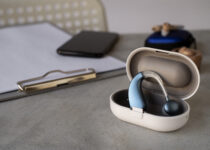Why Do Defendants Wear Headphones In Court?
Have you ever wondered why defendants in courtrooms often don a pair of headphones? It’s a curious sight, isn’t it?
These seemingly inconspicuous accessories serve a crucial purpose, and in this brief introduction, we’ll unveil the reasons behind this enigmatic practice.
Let’s deep dive.
Why Do Defendants Wear Headphones In Court?
Defendants may wear headphones in court to communicate with their attorneys or interpreters discreetly.
These headphones often connect to a communication system that allows private conversations during proceedings.

They are used to ensure client-attorney privilege and effective communication in cases where sensitive information or language barriers are involved.
Additionally, defendants might wear noise-canceling headphones to minimize distractions in a crowded and noisy courtroom, helping them focus on the proceedings and better understand their legal counsel’s advice.
5 reasons why defendants wear headphones in court?
Defendants wear headphones in court for various reasons, including:
1. Communication with Attorneys:
Headphones can be used to establish a private channel of communication between the defendant and their attorney.
This ensures that sensitive information is not overheard by others in the courtroom, maintaining attorney-client privilege.
2. Language Translation:
In cases involving non-native English speakers, defendants may use headphones to receive real-time translation services.
Interpreters can help them understand the proceedings and effectively communicate with their legal counsel.
Here can you wash headphone pads?
3. Hearing Assistance:
Some defendants may have hearing impairments or difficulty hearing in a crowded and noisy courtroom.
Headphones can be equipped with hearing aids or audio amplification systems to ensure they can follow the proceedings clearly.
4. Minimizing Distractions:
Noise-canceling headphones can help defendants block out distractions in a hectic courtroom, allowing them to concentrate on the legal proceedings and better understand their attorney’s advice.
5. Privacy and Security:
Defendants may wear headphones to prevent eavesdropping or to maintain confidentiality regarding case details. This added layer of security is especially important in high-profile or sensitive cases.
These headphones serve both practical and legal purposes, ensuring that defendants can participate fully and confidentially in their court proceedings.
Are there any legal or ethical implications of wearing headphones in court?
The use of headphones in court can have legal and ethical implications, and these may vary depending on the specific circumstances and the rules of the court:
1. Attorney-Client Privilege:
The use of headphones for private communication with an attorney is generally protected by attorney-client privilege.
This ensures that confidential discussions between the defendant and their legal counsel remain private and cannot be used against the defendant.
2. Interpreter Services:
When headphones are used for language translation, it ensures that non-English speaking defendants can fully understand the proceedings.
This is ethically important to ensure fair and equitable access to justice.
3. Fair Trial:
The use of headphones for translation or hearing assistance may be necessary to guarantee a fair trial, particularly when the defendant has a disability that affects their ability to participate in the proceedings.
4. Discretion and Decorum:
While the use of headphones is often necessary, there may be ethical considerations regarding the appearance and behavior of the defendant in the courtroom.
Here is how to connect two headphones to iPhone.

Defendants should strive to be respectful and not appear disrespectful or disruptive while wearing headphones.
5. Court Rules and Regulations:
Courts typically have specific rules and policies governing the use of headphones, so it is crucial for defendants and legal counsel to comply with these regulations.
Failure to do so could have legal consequences.
Thus, wearing headphones in court is generally accepted and often necessary to protect legal rights, ensure a fair trial, and provide access to justice.
However, it is essential to follow court rules and maintain decorum to avoid any legal or ethical complications.
Do defendants have the right to wear headphones in court?
Well defendants generally have the right to wear headphones in court for specific purposes that are legally or ethically justified.
These purposes often include communication with their attorneys, language translation, or hearing assistance to ensure a fair trial.
However, this right is subject to the rules and regulations of the specific court in which the proceedings are taking place.
Court rules may specify the types of headphones allowed, when they can be used, and any necessary permissions.
Therefore, while the right to wear headphones is generally upheld to facilitate a fair and just legal process, it is subject to the discretion and policies of the court.
Here, dropped airpods in a toilet?
Related faq’s
Why does everyone sometimes put on their headset and the trial is mute during the Derek Chauvin case?
During the Derek Chauvin trial, the courtroom occasionally went mute when participants, such as the judge, attorneys, or witnesses, wore headsets.
This allowed for private, off-the-record conversations or sidebar discussions, ensuring that sensitive matters, legal strategy, or procedural issues were not heard by the public or jurors, maintaining a fair and just trial.
Why do people have headphones in court?
People wear headphones in court for private communication with attorneys, language translation, or hearing assistance.
These headphones ensure confidential discussions, help non-English speakers understand proceedings, and assist those with hearing impairments, promoting fair trials and effective communication while adhering to courtroom regulations.
Why did Mark Jensen wear headphones in court?
Mark Jensen wore headphones in court to receive audio translation services.
In cases involving non-English speakers, defendants use headphones to understand proceedings and communicate effectively with their legal counsel, ensuring a fair trial while overcoming language barriers.
What does it mean when someone wears headphones all the time?
When someone wears headphones all the time, it may signify a desire for isolation, focus, or escape from their surroundings.
They might be listening to music, podcasts, or audio content to reduce external noise or immerse themselves in personal interests, which can be a coping mechanism, source of entertainment, or means of concentration.
Conclusion:
In conclusion, the use of headphones in court by defendants serves various purposes.
It helps ensure a fair trial by allowing confidential communication with legal counsel and minimizes distractions.
Moreover, it underscores the importance of clear and private communication, emphasizing the significance of a just legal system.




